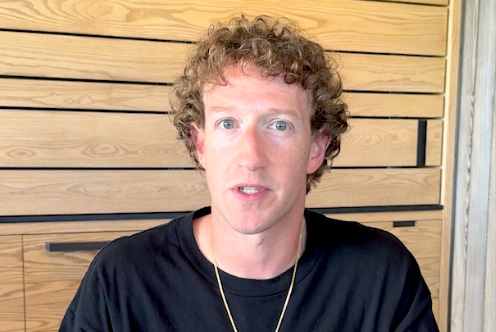We need an exit plan for Meta and we need it now

Opinion
In light of Meta’s content moderation changes and cut to DEI budgets, many are asking: what can we do? Here are four considerations to act on right now.
Last week, Meta dropped a clusterf*ck of a moderation policy change out of nowhere, setting social media and professional circles furiously ablaze. At the heart of this controversy lies a decision that doesn’t just damage Meta’s reputation but throws its entire ecosystem into question.
The decision? Human epitome of masculinity Mark Zuckerberg saw an opportunity to strike a nail in TikTok’s coffin and cosy up to Donald Trump, at the bargain price of throwing LGBTQIA+ communities under the bus.
For us as a community and an industry, this isn’t just another scandal; it’s a wake-up call. Let us all be reminded: Meta is no public square. It’s a platform propped up by the illusion of openness while some quietly pull the strings.
‘Too big to fail’? Industry reacts to Meta content moderation changes
Blindsided
Last week, Meta didn’t just overstep; it bulldozed through boundaries.
From removing fact-checking teams in the US to quietly changing its global hate speech definitions, Meta also deleted once-championed trans and non-binary Messenger themes and killed its diversity, equity and inclusion programmes.
But that’s not all. Its highest-ranking gay executive tried to sell it as “people seeing their queer friends and family members abused on Facebook and Instagram could lead to increased support for LGBTQ rights”. (Yes, that’s the chief marketing officer.)
We also can’t ignore news of “accidentally” deleted content from high-profile queer groups. How about its about-turn with the AI profiles it wanted to introduce? It’s a small reassurance that Meta staff feel as blindsided and furious as we do, but it feels unlikely to achieve anything.
Global repercussions
The implications for LGBTQIA+ communities and all minority groups, now effectively labelled as mentally ill or someone’s property, are revolting.
As a digital marketing strategist, I can’t help but consider the wider impact on advertisers, minority communities and audiences desperately searching for safe spaces online. This has global repercussions. For marketers and businesses, this is more than a challenge — it’s a moment of truth.
As a queer person, the question I’ve seen most is: what can we do? And if there’s one thing you need to know about me — I have opinions.
Consider your platform use
Bigger brands might find it easier to pivot. They have the tools to adapt and remember marketing pre-Meta.
However, for small businesses and solo marketers, abandoning Meta isn’t just a decision — it’s a potential risk to their survival. Small and medium-sized businesses, the real engine of Meta’s ad income, often operate with lean teams where a single marketer handles everything. How many of us started there?
These teams, often dismissed as the “colouring-in department”, know their work can make or break their company. Would you have told your bosses to sack off Meta in their shoes? And with the state of X and TikTok’s uncertain future, what alternative would you propose?
Sticking your head in the ground isn’t an option. The hate speech changes are global, with a tiny “your geographical region may vary” disclaimer at the bottom. (Pssst, Meta, if you’re reading this — we’re already watching you and keeping the receipts.)
This dependence means we as an industry need to educate and advise better. Brands of all sizes, from C-suites to content schedulers — all must understand the impact of their Meta investments.
Engage with your network and discuss options. Help them see the bigger picture and a path forward. Your good deed for Q1? Provide free education to a connection — or five — about alternatives to Meta.
Consider queer talent
Safeguard your talent. They are likely fearful and hurting. If you’ve shared a rainbow flag anywhere, we want you to demonstrate the allyship you’ve pledged.
From agency employee resource groups to small independents with pronouns in email signatures, talk to us and ask for our thoughts. Not just broad LinkedIn statements or all-hands emails. Actual human conversations. Now is your chance to prove your concern extends beyond Pride month.
It’s one thing to make sure we’re not working on a particular account for a particular client, but this is the very ecosystem you’re expecting us to operate in.
In TikTok lingo, I got told to “unalive myself” last week. Being exposed to hate speech and seeing the disintegration of your online communities in your personal life is one thing, but expecting your talent to suck it up during work hours is frankly unacceptable.
May the rest of your professional life be filled with 5pm Friday meetings with clients who want the red in the logo to look more red.
Consider client investments
An X-style advertiser exodus isn’t on the horizon… yet. But what would it take for us to reconsider where we put our money? How much harm is too much? At Outvertising, we’re done with them. By the time this is published, we’ll have begun our Meta exit process. I created our BlueSky account this morning.
And if you’re in the interim? It’s no longer just about money in, numbers out. The time has come to factor in the toxicity of the platforms we use, not just wielding publisher and content blocklists but thoughtfully reconsidering where, and how, we show up and engage.
As media folk, yes, we need to bring home the bacon, but we have a responsibility to align our actions with our values and build more sustainable strategies for the future. Read that last part again.
The answer starts with taking control. Lean in to first-party data, reconnect with your networks and discuss what comes next. There’s no perfect plan and I’m just as enthused about returning to an email-led strategy as you are.
But the direction is clear: move away from platforms that don’t align with your values. The media landscape is vast and it is evolving. Social platforms are just one part of the opportunity.
Consider the wider communities
To mobilise, conversations must happen at all levels, from chief marketing officers to content creators, from international agencies to local indies. It’s not OK to see peers shrug this off or hide behind a holding company’s party line.
There will be audience churn. Not everyone in the queer community has the time, energy or desire to engage with this mess. Not everyone is an activist and nor should they have to be. But the need for new, safe spaces is undeniable — and they will be made and they will be decentralised for some time. Sh*t is going to get annoyingly messy.
Marketers, ask how you’ll reach these communities. Talk to your teams. Their insights will guide the next steps.
And allies, it’s time to show up. Put your money where your mouth is. If you’ve exited X and don’t have meetings scheduled to discuss next steps, let me be the first to ask you: what are you playing at?
Let’s be clear: we need an exit plan. And the roadmap will not be simple. It’ll be frustrating and uncomfortable, but necessary. The time to act is now.
Stop putting all your eggs in Meta’s basket. Diversify. Explore Reddit, Snapchat, Discord, Twitch, Bluesky, direct email, carrier pigeon… Go where your audiences are. Invest in your relationships with those who come to you directly — you’re going to need them.
Seen influencers urging followers to sign up for newsletters? That’s the energy we need. Take back control. Build your own future. Start now.
 Sonnie Spenser is a digital marketing strategist and communications co-director at Outvertising
Sonnie Spenser is a digital marketing strategist and communications co-director at Outvertising




